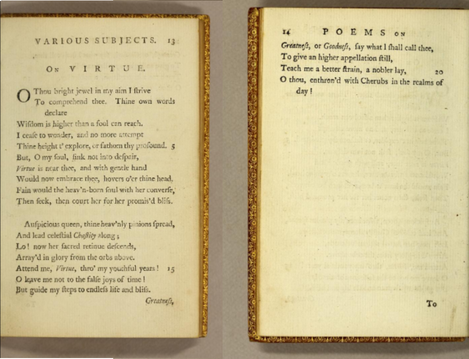|
[Originally published on Facebook 30 April 2021]
Our third and last poem is called, “On Virtue”, and it also belongs to Phillis’ poetry collection entitled, “Poems on Various Subjects, Religious and Moral” that was published in 1773. As always, a link to the digitized version is provided at the end of this post. Enjoy the poem: O thou bright jewel in my aim I strive To comprehend thee. Thine own words declare Wisdom is higher than a fool can reach. I cease to wonder, and no more attempt Thine height t’explore, or fathom thy profound. But, O my soul, sink not into despair, Virtue is near thee, and with gentle hand Would now embrace thee, hovers o’er thine head. Fain would the heaven-born soul with her converse, Then seek, then court her for her promised bliss. Auspicious queen, thine heavenly pinions spread, And lead celestial Chastity along; Lo! now her sacred retinue descends, Arrayed in glory from the orbs above. Attend me, Virtue, thro’ my youthful years! O leave me not to the false joys of time! But guide my steps to endless life and bliss. Greatness, or Goodness, say what I shall call thee, To give a higher appellation still, Teach me a better strain, a nobler lay, O Thou, enthroned with Cherubs in the realms of day! Here, it seems that Virtue and Wisdom are related, and that Virtue is a means to Wisdom. Ordinary people (the “fool”) cannot reach Wisdom because Wisdom is too high. This could make us “to cease to wonder, and no more attempt/ Thine height t’explore, or fathom thy profound”. What is left for us besides having our soul sinking “into despair”? Virtue. Virtue can not only save us from despair, but also it can serve as a guide to “endless life” and “promised bliss”. In other words, Wheatley is suggesting that Wisdom is not reached directly, but through Virtue. Thus, rather than seeking to be a wise person, she thinks we should seek to become a virtuous person first. Now, what do you make of “Teach me a better strain”? To me, Wheatley is talking about two things: what is seen and what is not. The colour of our skin is something that is seen; a virtuous soul is something that is not. It would not matter the colour of someone’s skin, for instance, but only whether that person is virtuous. Digitized Version [Internet Archive]: https://archive.org/.../poemsonvarioussu.../page/13/mode/1up -MM
0 Comments
Leave a Reply. |
Authors
Jacinta Shrimpton is a PhD student in Philosophy at the University of Sydney. She is co-producer of the ENN New Voices podcast Archives
May 2024
Categories
All
|

 RSS Feed
RSS Feed